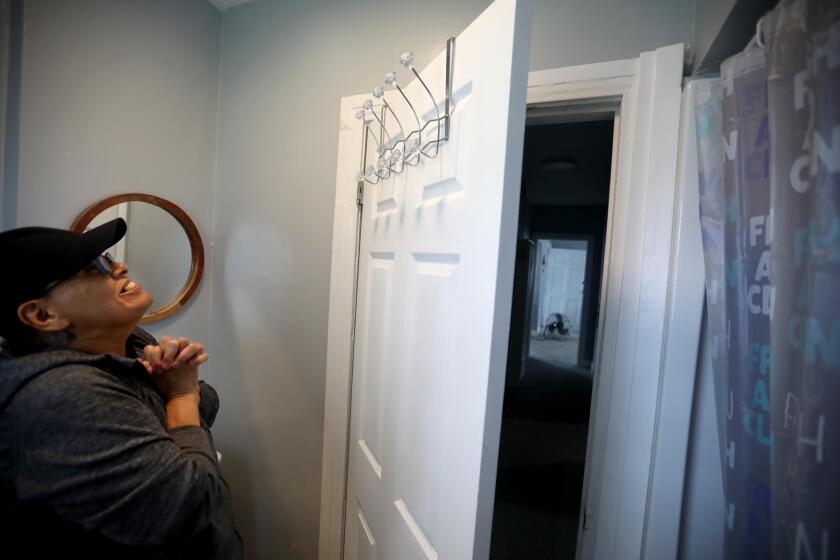Roth Lawyer Says Supervisor May Admit Guilt : Investigation: Acknowledging violations of Political Reform Act and paying fine ‘is the most likely scenario’ for resolving conflict probe, the attorney predicts. He doesn’t expect criminal charges.
Supervisor Don R. Roth’s lawyer predicted Wednesday that Roth may have to acknowledge committing violations of the state’s Political Reform Act and pay a fine because of the current imbroglio over his political contacts.
“That is the most likely scenario,” said Costs Mesa attorney Dana Reed. “If it is determined he has violated the act, that would certainly be my recommendation--stipulate to it and pay the fine. Don’t fight it.”
Reed has said previously that Roth may have to revise his gift-reporting statements to correct “technical” lapses. But the lawyer’s comments Wednesday were the strongest acknowledgment to date from the Roth camp that the supervisor could face fines or more serious disciplining.
Reed’s remarks followed the latest in a series of potentially damaging disclosures concerning Roth. The Times Orange County Edition reported Wednesday that Roth apparently backdated by 16 months a document that is now central to an investigation into whether he traded political favors for gifts.
Roth declined to comment Wednesday on the case and has referred all questions to Reed.
The Orange County district attorney’s office and the FBI are conducting separate investigations into whether Roth violated conflict-of-interest regulations and other political laws in his contacts with local business people, particularly members of the Dougher family--which owns a dozen Orange County mobile home parks.
The Times has reported that Roth failed to list in state-required financial disclosure statements that the Doughers had hosted him on three trips to Santa Catalina Island, bought him many meals around the state and gave him what amounted to an $8,500 loan through an unusual rental agreement.
Last December, two weeks after one of the Catalina trips, Roth voted along with the other four supervisors to approve a $5-million condominium project on land owned by the Doughers, overturning the Planning Commission’s rejection of the project.
The FBI has said that it wants to determine whether Roth took part in a “quid pro quo” with the Doughers to exchange gifts for political favors. Such an arrangement could constitute a federal crime.
In addition to his dealings with the Doughers, Roth also failed to disclose in government filings that he had been given use of vacation condominiums by several other people with business before the county, The Times has reported.
The most recent disclosure on Wednesday centered on a lease with the Doughers that stated Roth could live in one of their Anaheim parks but defer paying any rent until after he moved out. Roth has said that he lived at the park from mid-1990 through late 1991, after the breakup of his marriage. He said he gave the Doughers a check for $8,500 in January, 1991, to cover 17 months’ back rent.
Roth has pointed to that rental agreement, dated Aug. 15, 1990, to show that always intended to pay rent at the park. But one of his landlords, Donald G. Dougher, said this week that the agreement had been backdated by more than 16 months and was not signed by him or Roth until January, 1992.
Reed, who is working with criminal attorney Paul Meyer in representing Roth, said in an interview Wednesday that the backdating issue has no bearing on the case. Reed added that he remains confident that no criminal charges will be brought against Roth.
“The chances of there being a criminal action are so remote,” Reed said.
Despite the FBI investigation, Reed said he does not believe the issues raised by the Roth case involve any violation of federal law. It is more likely, he said, that enforcement actions would come from either the district attorney or the state’s Fair Political Practices Commission, which is also looking at the Roth case.
The lawyer said there remains the prospect that the district attorney or the FPPC--whichever assumes jurisdiction--will find no evidence of violations and “this whole thing will just go away.”
Among other defenses, Reed said he will continue to assert that the $8,500 rental loan is exempted from state reporting requirements because it concerned Roth’s primary residence. “We haven’t given up on that theory,” he said.
But Reed said the most likely scenario is that authorities will bring a non-criminal, administrative action for alleged violations of the state’s Political Reform Act of 1974 and that Roth might then enter into a stipulation acknowledging violations of portions of the act.
Fines of up to $2,000 can be levied for each violation. “History would tell us there will be a fine,” Reed said. “In the broad scheme” of the dozens of actions taken each year by the FPPC, Reed added, “that hardly is a blip on the screen.”
Reed said he does not know when the case will be resolved, but he noted that the FPPC often takes up to two years to bring enforcement actions.
Officials with the FBI, the FPPC and the district attorney all declined comment on the status of their inquiries.
More to Read
More to Read
More to Read
Start your day right
Sign up for Essential California for news, features and recommendations from the L.A. Times and beyond in your inbox six days a week.
You may occasionally receive promotional content from the Los Angeles Times.






